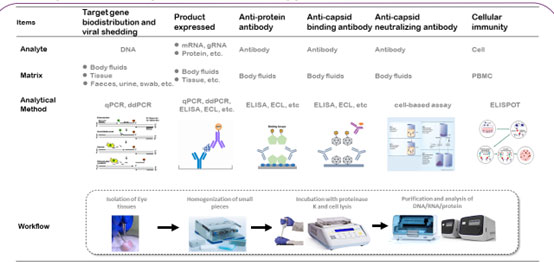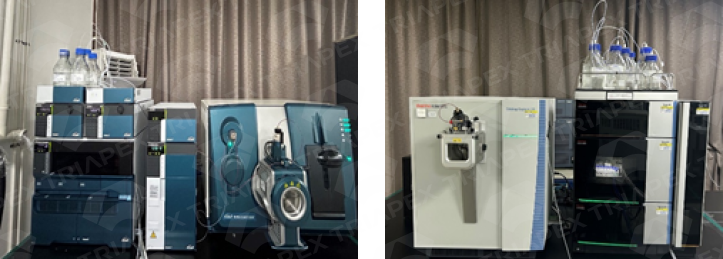
There are two major challenges in the bioanalysis of eye tissue, i.e. the isolation of very fine ocular tissue, and the analysis of micro- amounts of tissue. TriApex has successfully conducted various types of bioanalysis of the eyes, from small animals to humans, and has developed unique capabilities in bioanalytical techniques of eye tissues such as:
Precise collection of eye tissues
Analysis of large molecules (antibody drug, AAV-GOI, ADA, etc.)
Analysis of small molecules (siRNA, etc.)
Analysis of liquid biomarker (the tear, aqueous humor, vitreous.)
In vitro Melanin Binding Analysis
 Introduction of Services
Introduction of ServicesWe can precisely dissect the ocular tissues and record the weights of the cornea, lens, iris/ciliary, vitreous body, retina, choroid, sclera and conjunctiva of various laboratory animals.
TriApex has established large molecular bioanalysis platforms in compliance with GLP/GCLP regulations. We have a series of assays including ELISA, ECL, qPCR, FACS and Cell-Based Assays. Our team can develop methods with high sensitivity and strong specificity to analyze ocular large molecules in a variety of biological matrices (aqueous humor, vitreous body, and retinal homogenate)
Measurement of:
Target protein/antibody concentration
Target gene
Immunogenicity
Biomarkers
Some of Analysis Instruments:

Ophthalmology Bioanalysis

TriApex has multiple bioanalytical systems, such as mass spectrometry (LC-MS/MS and LC-HRMS), which can support the small molecule bioanalysis in ophthalmology.
Some of Instruments

Measurement of:
Small molecule (drug molecules or related molecules)
Oligonucleotides (siRNA & ASO, etc.)
Peptides
Endogenous compounds
Delivery vectors: liposomes, nanoparticles, lipids, etc.
TriApex applies the electrochemiluminescence immunoassay (MSD) and cytometric bead array (CBA) for the analysis of various cytokines (IL-1β, IL-2, IL-4, IL-6, IL-8, IL-10, TNF-α, IFN-γ, IL-5 and GM-SCF, etc) and other biomarkers in ocular liquid components like the tear, aqueous humor and vitreous.
We are developing and validating an in vitro assay to analyze melanin affinity of drug molecules. It will provide a rapid assessment of melanin binding ability for ocular drug molecules.

